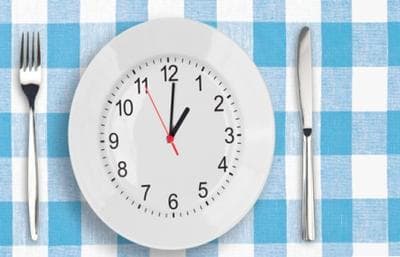Advertisement
Timing of Large Meal Matters For Weight Loss, Study Finds
Dieters take note: Eating earlier in the day may help you shed pounds.
Indeed researchers from Brigham and Women's Hospital and the University of Murcia in Spain found that it's not only what you eat but when you eat that matters when it comes to losing weight.

The observational study, published in the International Journal of Obesity, found that among a group of overweight or obese Spanish diners, those who ate a late lunch (after 3 p.m) showed slower weight-loss rates and lost significantly less weight than folks who ate lunch earlier (before 3 pm). Notably, there was no significant difference in overall calories consumed by either group or their estimated energy expenditures, said senior author Frank Scheer, PhD, MSc, director of the Medical Chronobiology Program and assistant professor of medicine at Harvard Medical School. Rather, "the timing of meals predicted weight loss effectiveness," he said.
(As is often the case in Mediterranean countries, lunch is the main meal of the day; for these study participants, it made up about 40 percent of total caloric intake for a 24-hour period.)
Scheer said the study corroborates earlier animal studies in which meal timing determined weight gain in mice.
So, what's going on here?
Scheer said one hypothesis is that when you eat meals at "abnormal" times there may be a disruption of the normal synchrony of metabolic clocks in various organs.
"The disruption of these metabolic clocks may underlie why we see such differences between the groups," he said.
Another possibility involves glucose uptake: "The speed at which glucose is taken up from the blood stream to the body tissue is different at different times of the day," Scheer said, "in the morning glucose is taken faster to the body tissue compared to later in the day."
Here are some more details from the news release:
To evaluate the role of food timing in weight-loss effectiveness, the researchers studied 420 overweight study participants who followed a 20-week weight-loss treatment program in Spain. The participants were divided into two groups: early-eaters and late-eaters, according to the self-selected timing of the main meal, which in this Mediterranean population was lunch. During this meal, 40 percent of the total daily calories are consumed. Early-eaters ate lunch anytime before 3 p.m. and late-eaters, after 3 p.m. They found that late-eaters lost significantly less weight than early-eaters, and displayed a much slower rate of weight-loss.
Researchers found that timing of the other (smaller) meals did not play a role in the success of weight loss. However, the late eaters—who lost less weight—also consumed fewer calories during breakfast and were more likely to skip breakfast altogether. Late-eaters also had a lower estimated insulin sensitivity, a risk factor for diabetes.
The researchers also examined other traditional factors that play a role in weight loss such as total calorie intake and expenditure, appetite hormones leptin and ghrelin, and sleep duration. Among these factors, researchers found no differences between both groups, suggesting that the timing of the meal was an important and independent factor in weight loss success.
“This study emphasizes that the timing of food intake itself may play a significant role in weight regulation” explains Marta Garaulet, PhD, professor of Physiology at the University of Murcia Spain, and lead author of the study. “Novel therapeutic strategies should incorporate not only the caloric intake and macronutrient distribution, as it is classically done, but also the timing of food.”
This program aired on January 29, 2013. The audio for this program is not available.
